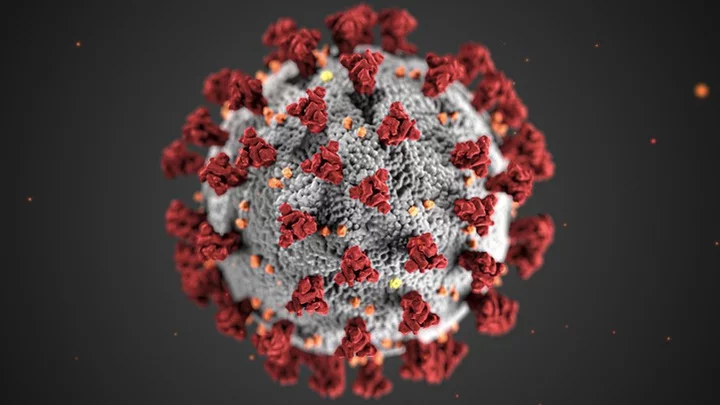Remember this image?
It’s been a while since we’ve had a COVID update, eh, readers?
Well, with the virus going around lately, and with changes in who is eligible for vaccine boosters (big changes? or maybe not?), we figured it was time to check back in with Dr. Candy Stockton, our county health officer, who was kind enough to catch the Outpost up earlier this week.
First up: You’ve probably noticed that the ’rona has been going around lately. Dr. Stockton said that although the county’s Public Health Division no longer tracks raw case numbers like it did in the bad old days of the pandemic, it has definitely noticed that the virus is on the rise.
In fact, Stockton
says, Humboldt County seems to be falling into a coronavirus pattern.
We usually get a smallish spike in the late summer – now – and a spike in January and February. [CORRECTION: This was a mistake. DHHS tells us that the spike in summer has been generally larger than the winter spike. The Outpost regrets the error. — Ed.]
“So far, the spike this summer is smaller than last summer’s spike, which is good, but it’s very definitely impacting people,” Stockton told us. “People are missing work. Kids are missing school. It’s impacting our hospitals.”
At least one Humboldt County person has died of the virus in the last month, Stockton said.
There’s a newish variant of the virus going around, one they’re calling the “XFG” or “Stratus” variant that seems to be quickly on the rise in the United States, and which is garnering some news attention. But Stockton is of the same opinion as the people quoted at the link in the last sentence: From the public’s perspective, there really isn’t much concerning about XFG. It’s not a particularly nasty version of the bug, and current vaccines should be effective against it.
Speaking of vaccines: This year’s crop of booster shots has been approved by the FDA, and vials should be reaching Humboldt County outlets within the next few days or weeks. But you’ve no doubt read about the Centers for Disease Control’s new guidelines about who should be receiving the shots – people 65 or older, or those with serious preexisting conditions. What does that mean for people under 65, or those who may or may not have those conditions? Can you still get your shot if you want them, even if you don’t meet those criteria? And where can you get it? And will your insurance pay for it?
There’s a lot that still not quite clear about all of this, but Stockton, right now, supposes that the coming year is actually not going to be all that different from years previous. She’s pretty certain that as in years past, pretty much the only thing you’ll need to get a COVID shot is the desire to have one.
“Some of the major pharmacy chains are waiting for a little bit more clarity and guidance from the states that they work in before they make that final determination,” she said. “But we do think that, yes, people probably will be able to walk into the pharmacy, let the pharmacist know that they’re at high risk or they live with somebody who’s at high risk, and be able to get the vaccine. And that’s what we’re working towards.”
Yesterday, New York Governor Kathy Hochul signed an executive order allowing that state’s pharmacists to administer the shot. California, Oregon and Washington – the states that make up the new “West Coast Health Alliance” – will probably do something similar, if they need to.
Likewise, Stockton said, insurance companies have signaled that they are willing to pay for shots, as they have in years past.
“[It] makes a lot of sense because vaccines are a relatively inexpensive, very cost-effective way to reduce medical costs,” Stockton said. “So if you’re an insurer and you choose not to pay for a vaccine that can save, you know, hundreds of thousands of dollars in hospitalization costs, it doesn’t take very long before you’re losing more money than you’re actually saving by not paying for the vaccine.”
So despite high-profile announcements coming from the Trump Administration, Stockton and others are fairly confident that nothing much is set to change in the short-term. Vaccines will be available in time for that big spike that the county’s expecting in the winter, and right now Stockton believes that if you want one, you will be able to get one.
And Stockton – coming at it from a public health perspective – very much hopes that you do.
“While I understand every person ultimately needs to make that decision for themselves, I do want to remind all of your readers that our healthcare resources — our hospital capacity, emergency room capacity — we’re stretched really thin as a county right now,” she said. “And it may not seem like a big deal if five or six people get hospitalized one week for COVID during the winter, if you’re just talking about numbers.
“But I think most people in this county have experienced, you know, having to go into the emergency room. And then having to spend a really long time in the emergency room because there are no open beds upstairs in the hospital. And so for those people who are able and willing, they could really help us out as a community by getting vaccinated to help our community. If they’re willing.”

CLICK TO MANAGE